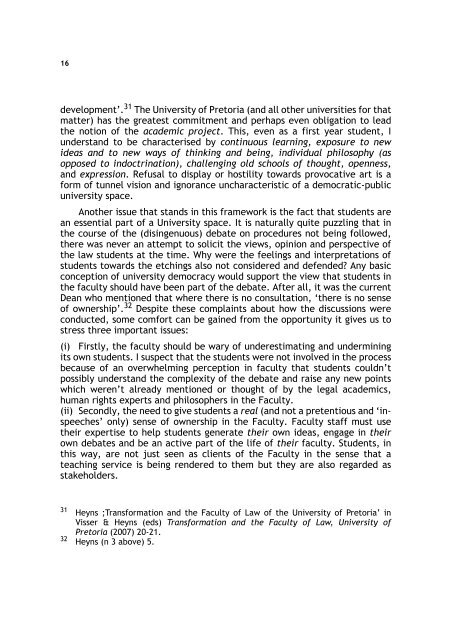Download this publication - PULP - University of Pretoria
Download this publication - PULP - University of Pretoria
Download this publication - PULP - University of Pretoria
Create successful ePaper yourself
Turn your PDF publications into a flip-book with our unique Google optimized e-Paper software.
16<br />
development’. 31 The <strong>University</strong> <strong>of</strong> <strong>Pretoria</strong> (and all other universities for that<br />
matter) has the greatest commitment and perhaps even obligation to lead<br />
the notion <strong>of</strong> the academic project. This, even as a first year student, I<br />
understand to be characterised by continuous learning, exposure to new<br />
ideas and to new ways <strong>of</strong> thinking and being, individual philosophy (as<br />
opposed to indoctrination), challenging old schools <strong>of</strong> thought, openness,<br />
and expression. Refusal to display or hostility towards provocative art is a<br />
form <strong>of</strong> tunnel vision and ignorance uncharacteristic <strong>of</strong> a democratic-public<br />
university space.<br />
Another issue that stands in <strong>this</strong> framework is the fact that students are<br />
an essential part <strong>of</strong> a <strong>University</strong> space. It is naturally quite puzzling that in<br />
the course <strong>of</strong> the (disingenuous) debate on procedures not being followed,<br />
there was never an attempt to solicit the views, opinion and perspective <strong>of</strong><br />
the law students at the time. Why were the feelings and interpretations <strong>of</strong><br />
students towards the etchings also not considered and defended? Any basic<br />
conception <strong>of</strong> university democracy would support the view that students in<br />
the faculty should have been part <strong>of</strong> the debate. After all, it was the current<br />
Dean who mentioned that where there is no consultation, ‘there is no sense<br />
<strong>of</strong> ownership’. 32 Despite these complaints about how the discussions were<br />
conducted, some comfort can be gained from the opportunity it gives us to<br />
stress three important issues:<br />
(i) Firstly, the faculty should be wary <strong>of</strong> underestimating and undermining<br />
its own students. I suspect that the students were not involved in the process<br />
because <strong>of</strong> an overwhelming perception in faculty that students couldn’t<br />
possibly understand the complexity <strong>of</strong> the debate and raise any new points<br />
which weren’t already mentioned or thought <strong>of</strong> by the legal academics,<br />
human rights experts and philosophers in the Faculty.<br />
(ii) Secondly, the need to give students a real (and not a pretentious and ‘inspeeches’<br />
only) sense <strong>of</strong> ownership in the Faculty. Faculty staff must use<br />
their expertise to help students generate their own ideas, engage in their<br />
own debates and be an active part <strong>of</strong> the life <strong>of</strong> their faculty. Students, in<br />
<strong>this</strong> way, are not just seen as clients <strong>of</strong> the Faculty in the sense that a<br />
teaching service is being rendered to them but they are also regarded as<br />
stakeholders.<br />
31 Heyns ;Transformation and the Faculty <strong>of</strong> Law <strong>of</strong> the <strong>University</strong> <strong>of</strong> <strong>Pretoria</strong>’ in<br />
Visser & Heyns (eds) Transformation and the Faculty <strong>of</strong> Law, <strong>University</strong> <strong>of</strong><br />
<strong>Pretoria</strong> (2007) 20-21.<br />
32 Heyns (n 3 above) 5.

















